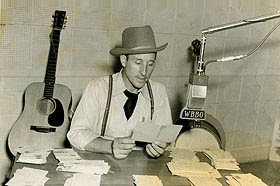The Grandfather of Bluegrass
That would be Wade Mainer, not Bill Monroe. A popular recording and radio personality, Mainer influenced generations of great musicians, including Bill Monroe, Ralph Stanley and Doc Watson. With his singing and banjo style, Wade and his band created a distinct sound that bridged the gap between old-time mountain music and bluegrass. Among his innovations was a distinctive two-finger banjo picking style crossing the traditional clawhammer with the modern three-finger picking style used by performers such as Earl Scruggs.
Born April 21, 1907, Mainer grew up on a tiny mountain farm near Weaverville, North Carolina. Old mountain songs were part and parcel of his upbringing and he was greatly influenced by the fiddling of Roscoe Banks, his brother-in-law.
“I was raised in the mountains back then and didn’t go out too much…but what there were of musicians, I would pay attention to them,” says Mainer. “I was interested in the sound of the banjo and when they’d lay there banjos down at the square dance…I’d go over and pick it up and play.”
As a young man, he moved to Concord to work in a cotton mill. Later he joined his brother J.E.'s Mainer Mountaineers, and began performing on radio in 1934. North Carolina was a hotbed of early country musicians during the Depression, and Wade Mainer stood out above the rest. The decade was a great time for brother acts, mostly duets, and mostly featuring close harmony singing with guitars or guitar and mandolin. These duos tended to supplant the larger string bands from the 1920s – traveling was easier, and there were less ways that gig money had to be split up during those hard depression days.
Along with his popular recordings Wade and his brother J.E. reached a wide audience with live radio programs sponsored by a patent medicine laxative called “Crazy Water Crystals.” Wade performed at Radio Stations WBT in Charlotte; WPTF in Raleigh; WNOX in Knoxville; and WPAQ in Mount Airy, among others. The sponsor kept him working but was notoriously stingy with pay causing Wade to part ways with both the sponsor and the Mainer Mountaineers in 1936.  “I didn’t think they was paying me enough at $5 per week…I left them and got me a job at the yarn mill at $12 to $15 per week…and that was gold back then!”
“I didn’t think they was paying me enough at $5 per week…I left them and got me a job at the yarn mill at $12 to $15 per week…and that was gold back then!”
Mainer and fellow bandmate Zeke Morris decided to work as a duet. They split up when Morris' younger brother Wiley joined to form the Morris Brothers. Mainer's new band was named the Sons of the Mountaineers; its first members included guitarists Jay Hugh Hall and Clyde Moody and fiddler Steve Ledford. They performed on the radio and also recorded many songs for Bluebird. In 1939, they had a good-sized hit with "Sparkling Blue Eyes."
Wade married singer/guitarist Julia Brown in 1937. Known as "Hillbilly Lilly," Julia performed from 1935-37 at WSJS RADIO in Winston–Salem, NC. A pioneering female vocalist, Julia would later join her husband for performances on the road.
Sources:
http://www.talentondisplay.com/kicprofiles04.html
http://www.unctv.org/folkways/wade_mainer/index.html
http://www.silcom.com/~peterf/ideas/bigbang_2005.htm
Originally blogged at Appalachian History
appalachian+history appalachian+culture history+of+appalachia appalachia




1 comment:
Thanks for this interesting history.
There must be bluegrass on the mind today... if you feel like hearing some--albeit not quite the original--check out: Johnny Cash & John Hartford: Bill Monroe Bluegrass Medley.
Post a Comment